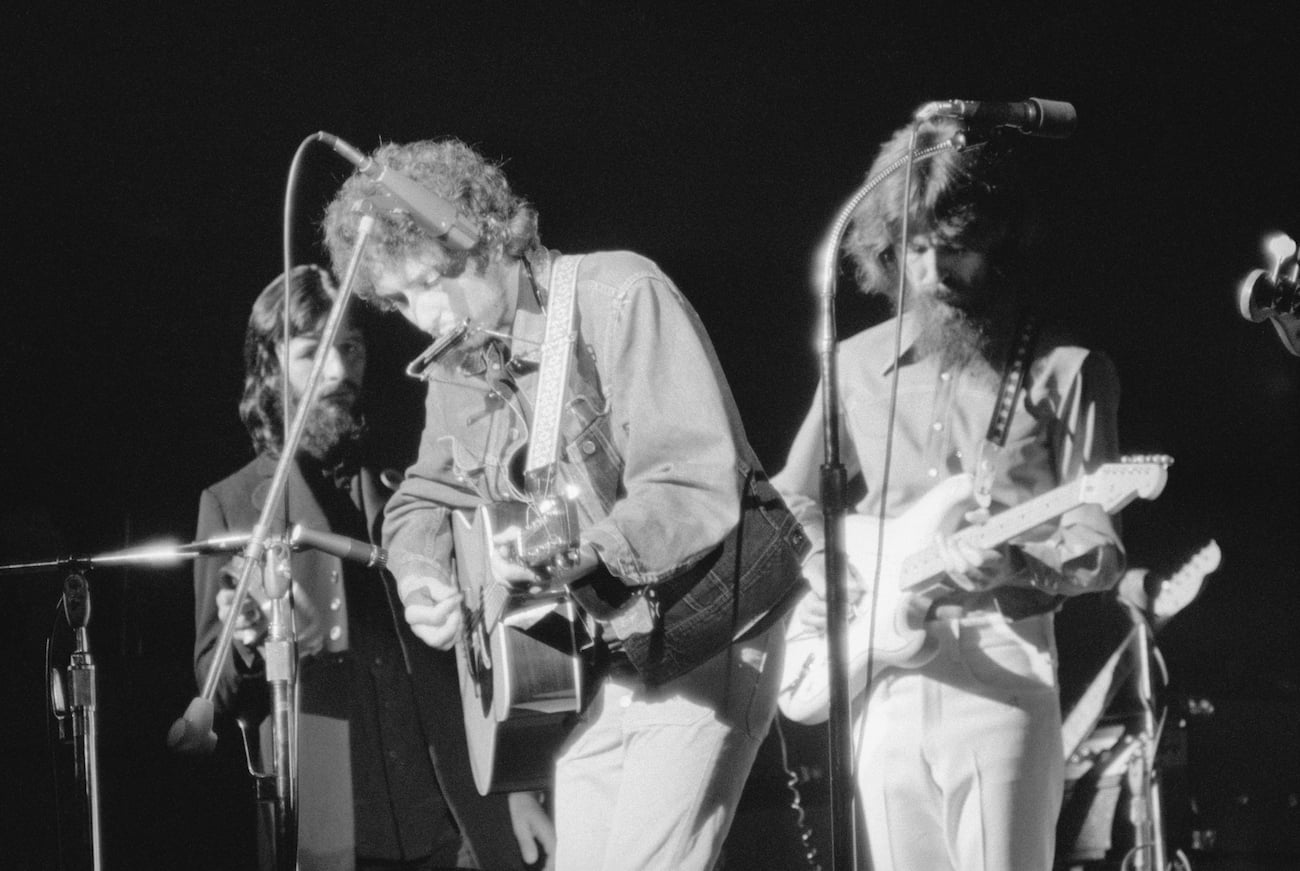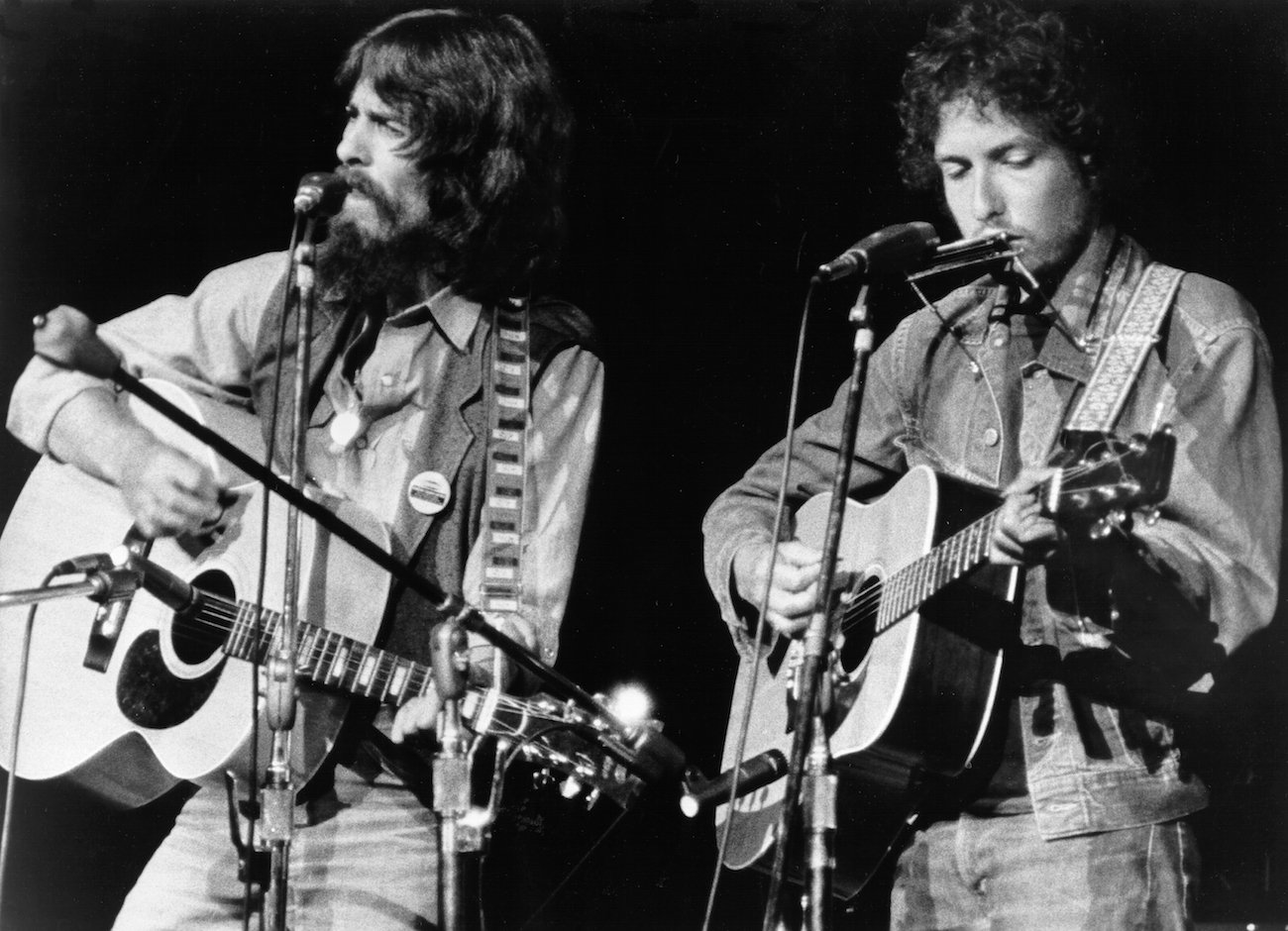
George Harrison Didn’t Play Any Beatles Songs During His 1968 Jam Session With Bob Dylan and The Band
George Harrison didn’t play any Beatles songs during his 1968 jam session with Bob Dylan and The Band. It was getting increasingly harder to remain as Beatle George; it was even harder once George saw how Dylan and The Band operated as a group.

Tensions were rising in The Beatles in 1968
In early 1968, George invited his bandmates to the Maharishi Mahesh Yogi’s retreat in Rishikesh, India. George hoped they’d enjoy learning about meditation and spirituality from the guru just as much as he did. However, none of them took to spirituality like him. It made George realize that he was diverging from the path his bandmates were on.
In Here Comes The Sun: The Spiritual And Musical Journey Of George Harrison, Joshua M. Greene wrote, “To the contrary, it seemed they could hardly wait to get home and pick up where they had left off bickering.”
Tensions were rising in The Beatles. The Beatle’s recording sessions had become so toxic that EMI engineer Geoff Emerick quit in July, “no longer able to tolerate the lost tempers and frequent swearing,” Greene wrote.
George penned “Not Guilty” about the “grief” Paul and John were giving him at the time. In 1987, he told Musician Magazine’s Timothy White, “It was me getting pissed off at Lennon and McCartney for the grief I was catching during the making of ‘The White Album.’
“I said I wasn’t guilty of getting in the way of their careers. I said I wasn’t guilty of leading them astray in our all going to Rishikesh to see the Maharishi.” He continued, “I was sticking up for myself.”
By November, George needed a break from The Beatles and visited Dylan and The Band for Thanksgiving.
George Harrison didn’t play any Beatles songs during his jam session with Bob Dylan and The Band
In November 1968, The Band invited George to stay with them and Bob Dylan in Woodstock, New York. George told White, “I think it was Robbie Robertson who invited me down. He said, ‘You can stay at Albert’s [Grossman, Dylan’s manager]. He’s got the big house.’ I hung out with them and Bob.”
George said it was an awkward time for Dylan and The Band, not just because Dylan was still in his self-imposed exile following his 1966 motorcycle accident. George claimed that Dylan and Grossman were fighting about the “crisis” of managing Dylan. The Beatle spent the days with Dylan and the nights with Grossman, hearing both sides of the “battle.”
So, George didn’t exactly escape drama. However, he did jam with Dylan and The Band here and there. That was the best part of his trip. Greene wrote, “It was a happy time spent making good music and communing with friends and their families.”
Watching Dylan during their spontaneous jam sessions showed George “how happy someone could be following his own direction and making his own rules,” Greene wrote. “If Dylan walked away at his moment of triumph to be his own man, why could George not do the same?”
George only wanted to leave The Beatles more and more, being around his friends. That’s why he didn’t play any Beatles songs during his and Dylan’s jam sessions. Artist Judith Jamison witnessed it all.
“What was interesting about that day was that not one Beatle song was sung,” she recalled. “There was lots of other music being played. George even asked me what I’d like to hear. I said ‘Over the Rainbow,’ and he kindly played it—but not one song from his Beatles past.
“It was music like in the movie De-Lovely—classic, American, a mix of everything, but no rock ‘n’ roll, no Beatles.”
Dylan wasn’t the only one who showed George what he was missing being in The Beatles.
George experienced how a proper group worked while visiting Dylan and The Band
During George’s visit, Dylan and The Band showed him how a band was supposed to operate. He explained to White that Robertson was wise and generous, and it made a difference.
“Artistically, I respect The Band enormously,” George said. “All the different guys in the group sang, and Robbie Robertson used to say he was lucky, because he could write songs for a voice like Levon’s. What a wise and generous attitude.”
Greene added, “When the Band played, they created tight vocal harmonies and rarely indulged in instrumental solos. George liked that natural modesty among musicians. Nothing could have been more satisfying—or more unlike the headaches of life as a Beatle.”
George’s stay proved to be a good thing for him. It was awkward initially with Dylan being closed off, but George got him to open up by playing music. They wrote “I’d Have You Anytime,” and George wrote “All Things Must Pass,” which The Beatles later passed on.
Unfortunately, George had to return to his band. It was like going backward, the same feeling he had returning to them after his trip to India in 1966. Only his trip to Woodstock was harder because he saw how well a band could work together.
George briefly quit The Beatles in January 1969. He returned, but his heart wasn’t entirely in it for the rest of the band’s life.


